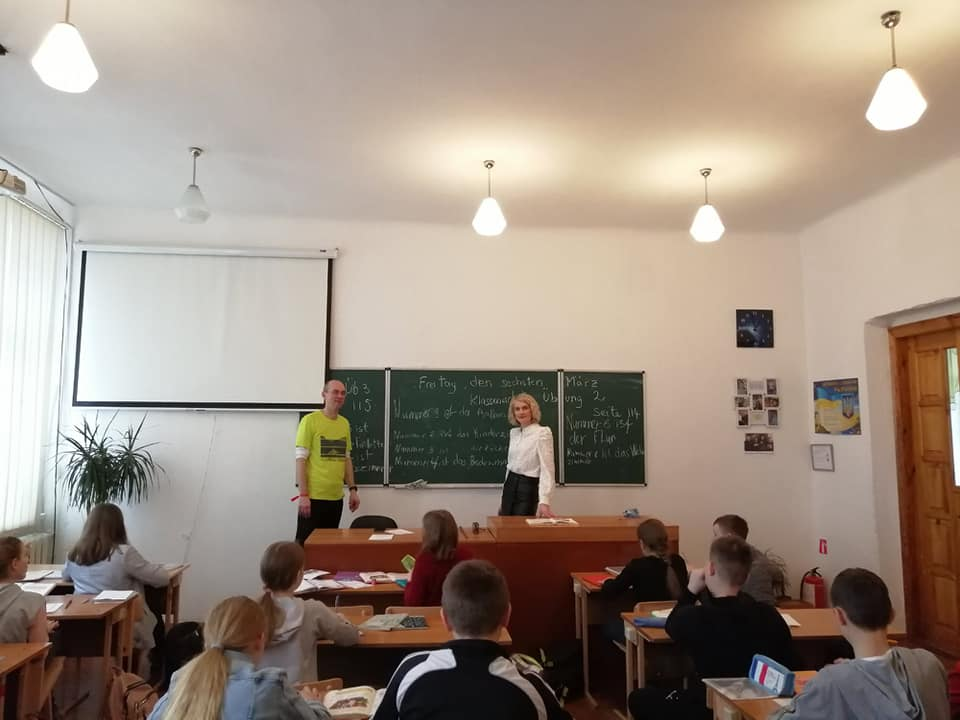The year 2020 required major adjustments for all the educational activities in the world. GoCamp was not an exception and had to go online.
For the first time in GoCamp’s history, there were volunteers from all the continents, except of course Antarctica. Due to the online format, volunteers from such faraway countries as Jamaica, El Salvador, the Philippines, Zimbabwe, Sudan, Indonesia, Peru, Haiti, Sudan, and Peru managed to join.
Euromaidan Press talked to Hubert to learn about his experience of volunteering online.


Hubert was one of 184 foreign volunteers from 55 countries who took part in the online camps last year. He is from France, working in the field of computer science. Participation in GoCamp for him is a continuation of his warm relationship with Ukraine which started during the Euromaidan Revolution in 2014.
“All the time I am asked why, why, why? You are normally interested in Ukraine because you have a family in Ukraine or you have a girlfriend in Ukraine. I have none of that. I am just in love with Ukraine. I learned the language, I am interested in what is going on in Ukraine.”
From the very beginning of the Maidan revolution to this day Hubert follows the events in Ukraine closely. But from the time he first saw the announcement for GoCamp volunteers, it took him two years to eventually join. The first camp he took part in was in 2019.
The online camps aim to be as interactive as possible — just as they would be in ordinary circumstances. Activities take place in different formats. Some are held during holidays when there are no classes, but after regular school camps end. Others take place during school classes when GoCamp volunteers or guests participate in classes to support the work of English language teachers.
“You always have guests that present either their profession or something related to the theme of the day. One day you dance, another you start drawing or play music. So you do what you want to do. You create your own space.”
In the afternoon, volunteers interact directly with kids. In total, Hubert has been involved in some 50 schools this year.
“I think I went to 15 schools in two weeks. Offline I would never do it. I went to Lviv [western Ukraine], and then to Zaporizhzhia [eastern Ukraine], and Ukrayinsk [eastern Ukraine, Donbas]. Then I finished in Odesa [southern Ukraine]. So that’s something you can do online. When I was at the Kamianets Podilskyi camp it took me all night to arrive.”
As Hubert observed, the interaction with the English language differs depending on the region.
“I had a class in Vinnytsia [central Ukraine] where kids were fluent in English. 15 kids. From the first to the last. Even the one who was completely silent. I asked her a question thinking that she would not speak very good English, but she answered in perfect English with no grammar mistakes. And then I went to Ukrayinsk (a town of 11,000 people in the government-controlled part of Donetsk Oblast, – Ed.) where kids strugle with English.”
However, no matter what the level of the kids’ English, the rule of the game Hubert set was that everyone had to speak. In the future, he wants to work in eastern Ukrainian schools.
“One of my friends, even now when she is almost 50, is remembering the time when she met a volunteer in Slovakia. It was something that changed her life. And she is working as a translator now. She even stayed in the language profession. So this is why I want to do more classes in eastern Ukraine. Because meeting kids from a lyceum in western Ukraine where they speak perfect English is good.
But in a small town of eastern Ukraine, one would not see a foreigner very often. So this is where I want to go. We are not expecting that they would start speaking perfect English or read books in English, but we are expecting that they will change the vision of the world that they have. Especially if they are from small towns, miners’ towns.”
Among GoCamp’s ultimate goals is to develop creativity in kids. For that initiative, they provided three programs: “Art & Creativity,” “Dreaming Big with Kyivstar,” and “Around the World.” Almost 3,000 school kids participated in them.
Hubert describes other programs devoted to entrepreneurial skills. These were followed with instructions by specialists from the mobile provider that sponsored the activity. Camp participants developed ideas for mobile apps.
“It was not the programming, it was all the things before. So there were tips on how to find an idea, how to organize yourself, brainstorming.”
As well, the kids were introduced to the Scrum technique (a project management tool used in the industry, to work together according to simple principles that even kids can use) and how to do mindmapping.
“It’s like a web of ideas. You have the main idea and then you have branches. And every branch is a topic of the idea and then you group the topics.”
Making a video presentation of a project was another of the activities.
“For me, participation in GoCamp is about life, where you want to give more than receive,” Hubert summarizes.
Further reading:
- GoCamps initiative invites English-speaking volunteers to inspire Donbas kids (2019)
- Going global: 600 volunteers from around the world teach kids English at summer camps in Ukraine (2017)
- GoCamp looking for volunteers to teach English to Ukrainian kids (2017)
- Would you volunteer teaching English to Ukrainian kids? (2016)
- Ukraine aims to break Guinness record with world’s largest English lesson
- Ukrainian volunteer award honors ordinary people doing extraordinary things
- Prometheus: the Ukrainian online learning platform aiming to revolutionize the country’s education



